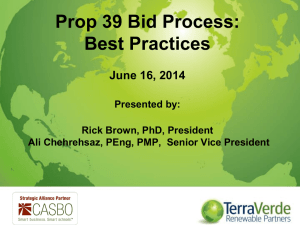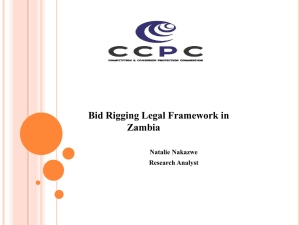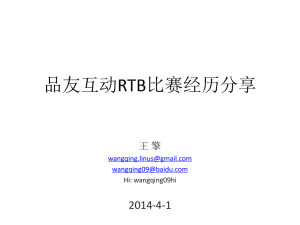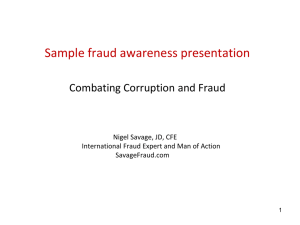NaTIONAL Treasury
advertisement
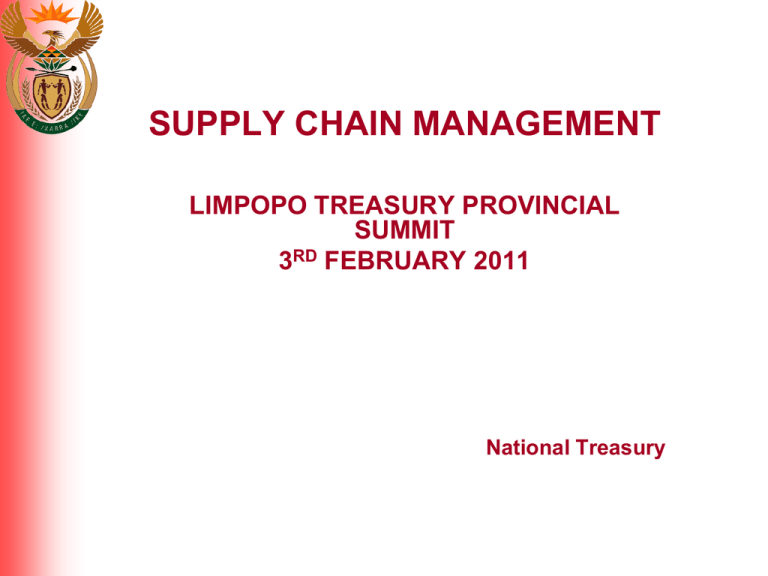
SUPPLY CHAIN MANAGEMENT LIMPOPO TREASURY PROVINCIAL SUMMIT 3RD FEBRUARY 2011 National Treasury CONTENTS • • • • • • • • Statutory Framework Constitutional Rights Market Price Analysis Alignment of PPPFA with the aims of BBBEE Combating Fraudulent and Corrupt Practices Supplier Performance Price / Bid Rigging Conclusion STATUTORY FRAMEWORK FOR PUBLIC SECTOR SUPPLY CHAIN MANAGEMENT Constitution PFMA / MFMA Act PPPFA Act B-BBEE Act Treasury Regulations Standard for Uniformity National Treasury Best practice guidelines Legislative Framework Other prescripts Uniform Procurement directives to three spheres of government Supply Chain Management Guidelines Standard Bidding Documents Practice Notes CODES OF CONDUCT FOR SCM PRACTICTIONERS AND BID COMMITTEE MEMBERS THE CONSTITUTION – Section 217(1) of The Constitution provides the basis for procurement by determining that: “When an organ of state in the national, provincial or local sphere of government, or any other institution identified in national legislation, contracts for goods and services, it must do so in accordance with a system which is fair, equitable, transparent, competitive and costeffective”. – The PFMA and MFMA with their respective regulations give effect to this prescript. Constitutional Rights This PRESCRIPT is not only a directive to officials, but it also confers a constitutional right on every potential supplier to offer his or her service to government when needed. Section 217(I) of The Constitution also confers: an obligation for national legislation to prescribe a framework providing for preferential procurement to address the social and economic imbalances of the past The Preferential Procurement Policy Framework Act (PPPFA) of 2000 and its accompanying Regulations, 2001 were promulgated to achieve these goals. PREFERENTIAL PROCUREMENT SYSTEM The PPPFA and Regulations incorporate the 90/10 and 80/20 preference point systems Allows the state to pay a maximum of 11.1% and 25% premiums respectively to promote equity ownership for HDIs or the RDP goals A maximum of 90 and 80 points represents price. Contracts awarded to the bidder who scores the highest total points (points for price added to points for HDI and RDP goals) BROAD-BASED BLACK ECONOMIC EMPOWERMENT Changing the Preferential Procurement landscape in the Public Sector •Preferential Procurement Being is being aligned with the aims of the B-BBEE Act And Its Codes Of Good Practice (In Consultation with the dti and EDD) •Joint Cab Memo (NT, dti and EDD) is in process of being tabled before Cabinet Market Price Analysis • Market price analysis is generally neglected – Minister of Finance • Concerns the actual prices prevailing in the market and the manner in which they are determines • It also determines how closely buyers and sellers are brought into communication with each other • It is the process determining if the asking price is fair and reasonable. Basically a process of comparing the price with known indicators of reasonableness • Fair and reasonable describes that the price is acceptable to both buyer and seller. • Examples of Price Analysis: • Analysis of previous price paid • Normal retail prices • Comparison of bidder’s price with prices of other bidders or published price lists When adequate price competition does not exist some reasons could be that specifications are not definitive, tolerances are restricted or production capacity limits those eligible to bid. Supplier Performance Bid Submission • Duly completed bid including standard bidding documents, tax clearance certificates, samples etc must be submitted before closing date and time of bid – late bids will be disqualified • Bids must be submitted to correct address • Offers must meet required specifications and conditions of bid • Must have the ability to deliver the required goods/services at right place, in the right quantity, with the right quality, at the right cost and at the right time. • Flexibility to meet clients demands • Any conflict of interest must be declared Supplier Performance Post Award • Supplier to appreciate green environment, good business ethics and being socially responsible • A financially stable supplier that is able to execute projects upon receipt of an official order • Must be able to adapt to latest technologies • Must have good record and reputation from previous clients and be able to maintain same standards • Must be able to attain the specified goals in the performance of a contract – avoid breach of contract COMBATING FRAUDULENT AND CORRUPT PRACTICES • Bidders to declare any conflict of interest (employed by state or spouses employed by state) • SCM practitioners to declare interest, impartiality and confidentiality • SCM Practitioners and BAC members compelled to sign undertaking of adherence to Codes of Conduct • Enterprises will be prohibited from conducting business with government for fraud or corruption or not adhering to contract conditions • No contracts will be awarded to persons whose names appear on the database for restricted suppliers or the Register for Tender Defaulters SCM ANTI-CORRUPTION INITIATIVES Tightening of controls •Institutions to submit tender programme •Variation orders – construction 20%, others 15% •Management of Contracts – (i) Evaluation – does the preferred bidder have the capacity / ability to execute the contract? (ii) Contracts to be vetted by legal council prior to signature (iii) Performance by contractors •Ensure payment within 30 days •Control of orders – order books, no funds budgeted, etc. •Contract above specified threshold to be awarded in consultation with the relevant treasury •Large contracts – process to be audited BID / PRICE RIGGING What is Bid Rigging • Any agreement (written or oral) between bidders that limits or reduces competition. It is a form of price fixing. • Bidders secretly conspire to increase prices or lower the quality of goods / reduce outputs (maximize profits) • It undermines the benefits of competitive bidding and eliminates competition. • Bid rigging which is a form of price fixing is bid fraud and is prohibited in terms of the Competition Act, Act 89 o 1998. “..On both a moral and practical level, there is not a great deal of difference between price fixing and theft…(Whish, 2001) BID / PRICE RIGGING Examples of Bid Rigging • Agreement on who will win the bid • Agreement on prices – Agreement to raise, lower, or maintain prices – Agreement not to negotiate on price – Agreement to limit discounts / rebates – Agreement on price formulas or guidelines • Agreement on who will bid for certain government departments • Agreement on who will bid in certain geographic areas BID / PRICE RIGGING Cover Bidding • In order to implement the bid rigging scheme, offenders often use a cover bidding scheme • Cover bidding (also called complementary, token or symbolic) occurs when firms or individuals agree to submit bids: That are higher than the bid of the designated winner, Known to be too high to be accepted, or That contain terms and conditions that are known to be unacceptable to the buyer • It is the most common form of bid rigging as it gives the appearance of genuine competition. Often used in the 3 quotes procurement process in collaboration with SCM practitioners. BID / PRICE RIGGING Other ways • Bid Suppression Companies agree to refrain from bidding or withdraw a submitted bid. • Bid Rotation Firms continue to bid, but they agree to take turn being the winning bidder • Market Allocation Competitors agree not to compete for certain customers or in certain geographic areas BID / PRICE RIGGING Consequences of bid rigging • Section 4 (1) (b) (iii) of the Competition Act, Act 89 of 1998 prohibits restrictive practices (including bid rigging) • Treasury Regulation 16A9 prescribes that government institutions can disregard the bid of a bidder or cancel a contract awarded to a supplier if that bidder or supplier has abused the SCM system or committed any corrupt or fraudulent act during the bidding process. • National Treasury in consultation with the Competition Commission has issued an instruction on 21 July 2010 intended to provide preventative measures to counter bid rigging. • Measures also intended to inform bidders about the illegality of bid rigging, the penalties applicable and possible investigations and imposition of administrative penalties by the Competition Commission. • Together with bid documents, bidders are required to complete sign and submit a Certificate of Independent Bid Determination. This would be taken into consideration in the evaluation process. BID / PRICE RIGGING Role of Bidders / Contractors PREVENT COLLUSION • Build a culture of compliance • Consumers and shareholders now demand ethical business practice DETECT COLLUSION • Encourage internal whistle blowing • “I didn’t know” is no excuse / defence REPORT COLLUSION • Minimise reputational harm and penalty • Apply for corporate leniency END _____________________________________________ 19

